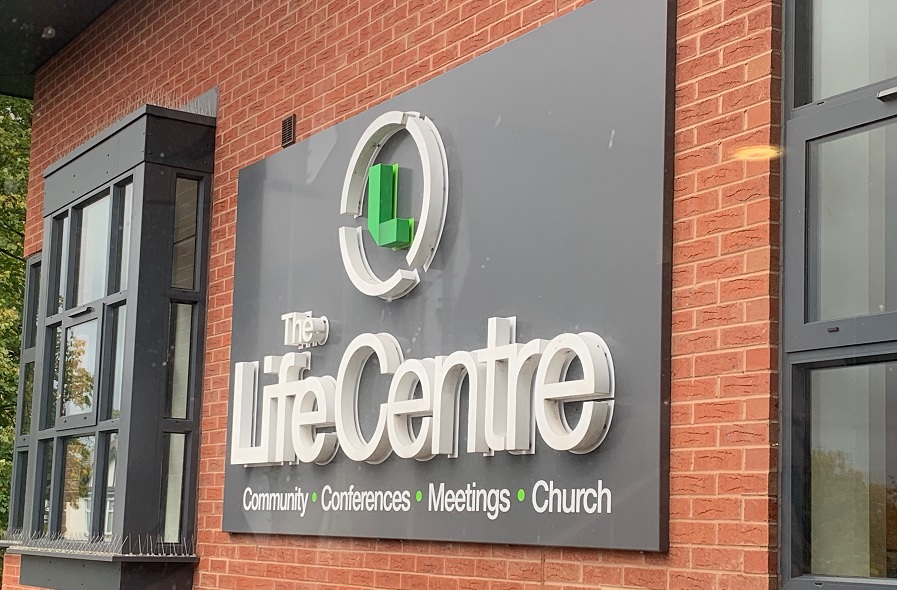
That's Life: The Life Centre in Sale was a fine venue for the event
The membership numbers are up. The finances are robust. The Arts Council is happy and partnership links are being made.
Issues surrounding child performance licensing, artistic development, good governance, diversity and inclusion and mental health are being addressed and tackled. Promotional benefits on insurance needs and contest participation are being offered and youth bands are being drawn to a rejuvenated championship event.
Even Boris Johnson could be persuaded by the solution for keeping an English presence in Europe.
Smiles
Little wonder there were smiles to be seen on the faces of Brass Bands England staff and leadership at the organisation’s first Brass Band Conference in Sale. And that was at the well attended Annual General Meeting at 9.30am.
In terms of the headline facts and figures, the year ending 31st March 2019 was an unprecedented success for the organisation.
Even Boris Johnson could be persuaded by the solution for keeping an English presence in Europe.
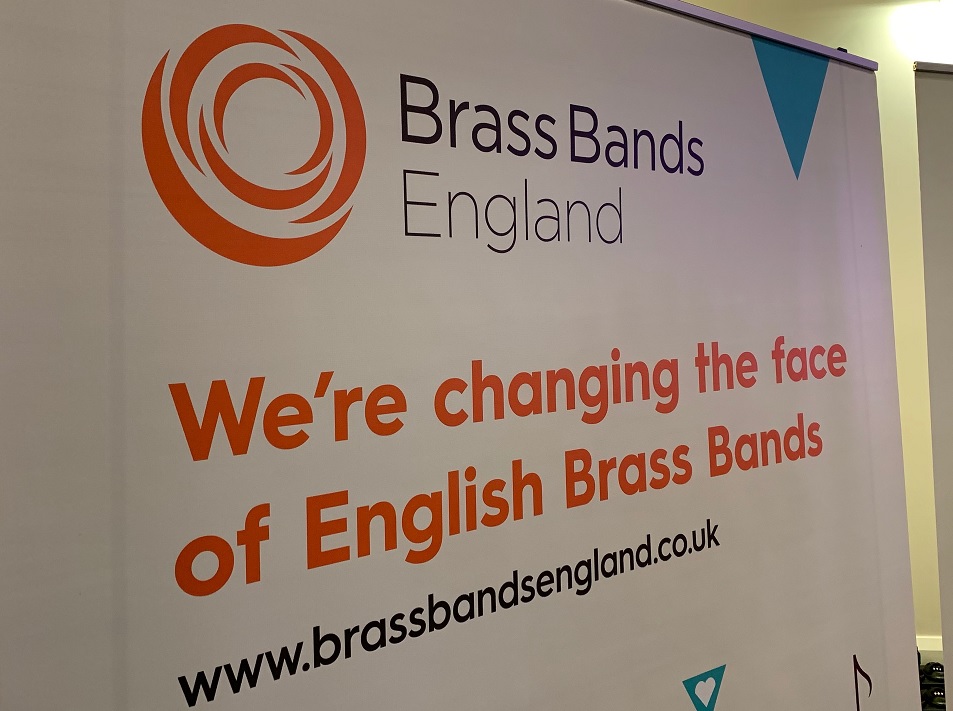
Ambition being met? The figures are encouraging
Membership was up 57% to 277 bands, and there was money in the bank. The Arts Council CEO Darren Henley was a welcome visitor to a revitalised National Youth Championships and the links made to music hubs and related organisations were paying constructive dividends.
The well-received series of artistic development and safeguarding courses had proven popular and effective (with others in the pipeline). Bands were gaining additional benefits, such as reduced entry fees to contests and discounts on music for their membership fee bucks.
Impressive outcomes
These were the impressive outcomes built on hard work and realistic ambition.
As a result, halfway through their current Arts Council England funding cycle, BBE is exceeding its target aims - and by some considerable margins.
By the time the organisation applies for a new funding cycle (2022-2026) the long term benefits of ‘Better Banding for All’ could well be felt by a majority of bands (contesting and non-contesting) in England.
These were the impressive outcomes built on hard work and realistic ambition.
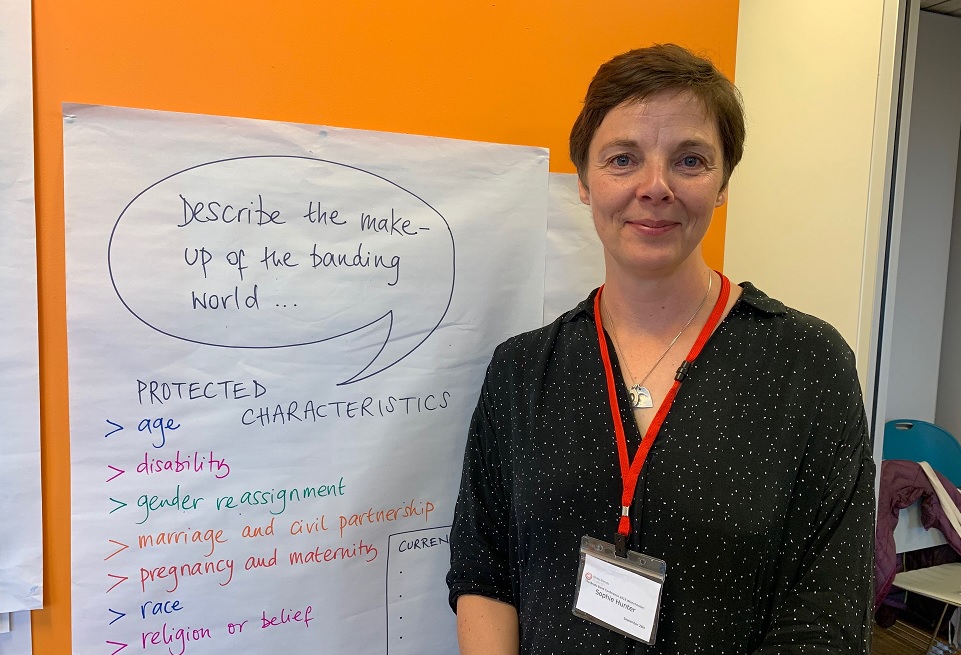
Worth the membership fee: Sophie Hunter led an excellent breakout session on Diversity & Inclusion
Challenges
Challenges remain however and there are bridges to be rebuilt.
The way in which the issues surrounding Child Performance Licensing (CPL) legislation at brass band contests were initially approached left a sour taste in the mouth with many event organisers who felt as if they were being dictated to, rather than co-operated with.
However, the importance of both understanding as well as implementing the legislation was undeniable and urgently overdue. Without the rather blunt wake-up call from BBE it could be argued that little would or could have been done.
No-one is in any doubt now that it forms an essential part of any organisation’s good practice. Any lingering rancour should finally be put to one side. The end result (which now sees BBE take a lead role) has made brass banding a better and safer place to include children.
The lesson may well have been learnt.
Any lingering rancour should finally be put to one side. The end result (which now sees BBE take a lead role) has made brass banding a better and safer place to include children.
Constructive
The excellent conference ‘break-out’ sessions on the topics of Diversity & Inclusion, Creative Funding, Safeguarding & CPL, Copyright, Recording Rights & Distribution and Mental Health certainly showed that it was pioneering important issues in a constructive manner.
This is what BBE can hold its head high about; engaging with a sense of co-operation with members and other bodies in a way that educates and informs for the benefit of banding at all levels. The plaudits (for the presenters too) are thoroughly deserved.
They (and other initiatives that are being considered) are worth the BBE membership fee in their own right.
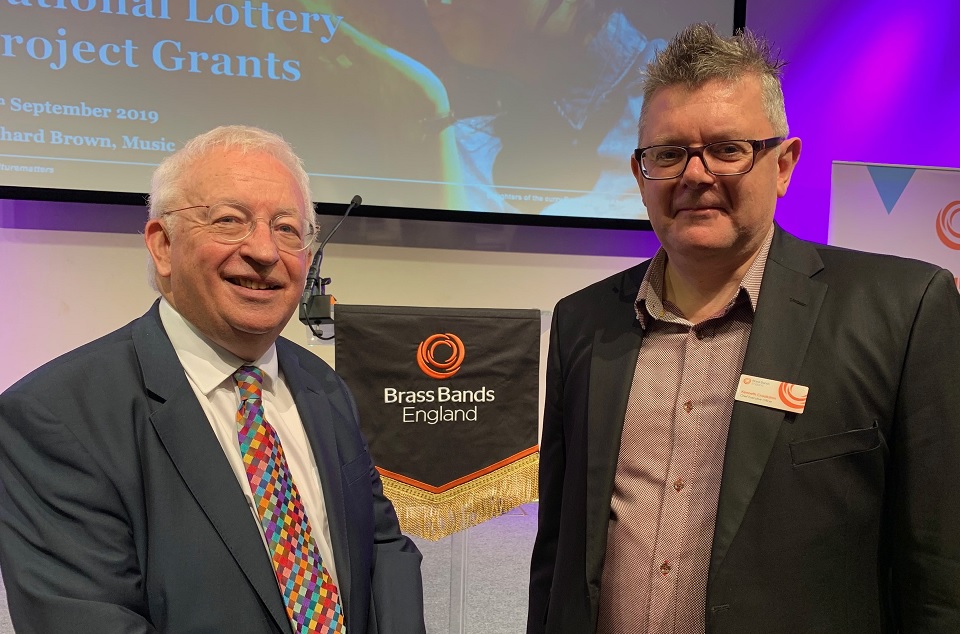
The key men on the day: Speaker Edward Gregson and BBE CEO Kenny Crookston
Ambition
What is perhaps a little more debatable in terms of value for money however, is the ongoing ‘ambition’ (and when speaking to people it is an undisguised one) to become contest promoters and organisers.
Be it with the potential hosting of the 2024 European Championships at Sage Gateshead, or to eventually become the custodians of the National Championships of Great Britain, these are challenges whose desired outcomes are not as easily achievable.
How BBE will financially underwrite the hosting of the 2024 European event has yet to be fully explained (although at the AGM it was announced that due to its Arts Council funding cycle, any ideas were still at a very early ‘scoping’ level).
The need to engage in a constructive long term relationship with Kapitol Promotions Ltd (the organisers of the National Championships of Great Britain) remains patently obvious.
They were the invisible Albert Hall sized piñata elephant in the room at Sale.
Elephant sized pinata
They were the invisible Albert Hall sized piñata elephant in the room at Sale.
In retrospect, their written response for not wishing to be part of the conference Panel Discussion on the ‘Big Question’ of the purpose and structure of brass band contests was well founded (met by what seemed a rather mischeivous metaphorical ‘shrug of the shoulders’ response when it was read out).
The debate itself proved to be a frustrating, and rather predictable missed opportunity.
Keynote excellence
That was highlighted by the excellence of Edward Gregson’s opening keynote Conference speech; one which spoke of the challenges that he felt lay ahead for the movement as whole.
His was a lucid, focused arc of balanced argument, the rhetoric measured yet pointed as he tackled some of the outdated shibboleths of the banding movement in the UK.
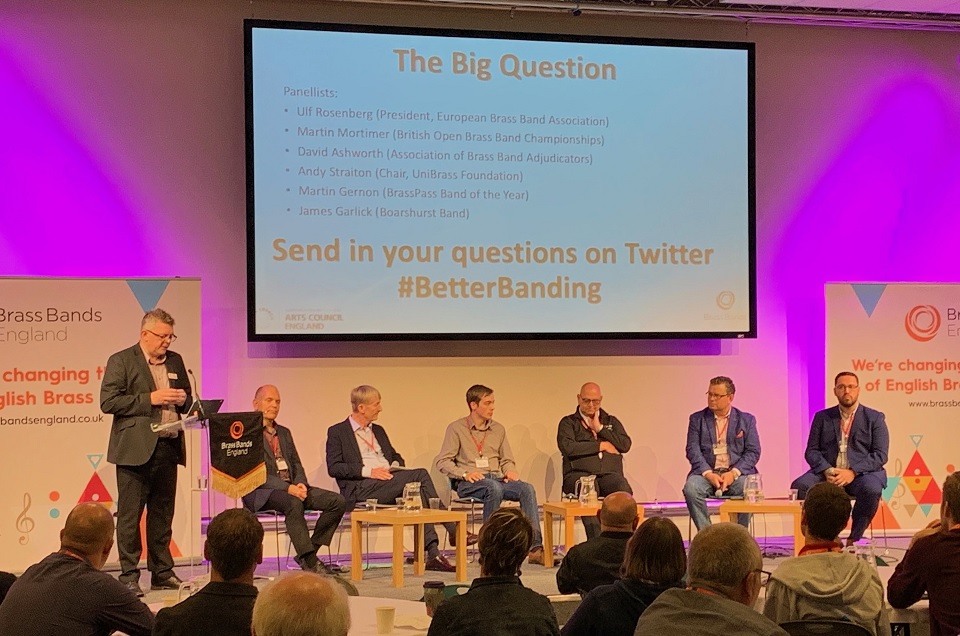
A big question but little response
One that couldn’t be torn down though was what he called the “obsession with the minutiae of contesting” - from adjudication to broadcasting, test-piece composition, contest ownership and national body organisation.
And within a few minutes (which did start with excellent contributions from an under-utilised panel of Ulf Rosenberg, Martin Mortimer, Andy Straiton, David Ashworth, Martin Gernon and James Garlick), the ‘debate’ soon became bogged down in that and more (including some curious on-line contributions).
Any analysis of the ‘purpose’ was lost in a series of well worn and tiresome contesting gripes.
We had to wait until Paul Fisher of Amersham Band (who acted as a great warm-up man) spoke about the challenges faced by his community based Fourth Section band that we finally focused on the initial question in hand.
Any analysis of the ‘purpose’ was lost in a series of well worn and tiresome contesting gripes.
Highly encouraging
And whilst the show of hands at its close to indicate whether or not people wanted ‘change’ (whatever that meant - although you suspected that the well beaten backside of the Kapitol Promotions piñata was the target) seemed conclusive, it was the equivalent of asking everyone in the room if they wanted to vote in favour of world peace, climate change and free vegan sausage rolls from Greggs.
In retrospect it was perhaps asking too much of Brass Bands England to have sorted that thorny old kernel out on what was a highly encouraging, well-organised and well-attended first Conference initiative (which was also broadcast on-line) - one that will hopefully become an increasingly important fixture in the banding calendar.
The banding community of England expects - and on this evidence Brass Bands England is certainly striving to do its duty by them.
Iwan Fox













